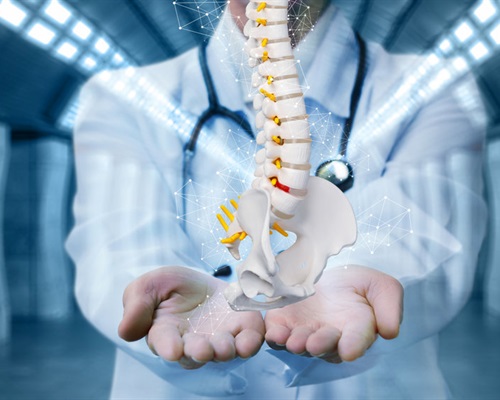
Osteoporosis is a serious disease that can make your bones weak and brittle over time. People with osteoporosis are prone to what we call fragility fractures. These are not normal fractures. It doesn’t take much to break bones weakened by osteoporosis; even a small fall or the stress of bending over or coughing can cause a fragility fracture.
Your bones are actually living tissue. That means they are in a continual state of renewal, being broken down and replaced by new bones. Once you hit your early 20s, your new bone growth begins to slow. As you age, your new bone growth may not be able to keep up with the bone loss. This gap in bone development creates osteoporosis.
In the early stages of osteoporosis, you’ll unlikely notice any signs or symptoms. But once the disease has progressed, you may experience:
Keep in mind these osteoporosis risk factors:
The technology also allows us to evaluate patients’ internal bone structure and determine the likelihood that they’ll break a bone in the next five years.That way, we can work together with our patients to treat osteoporosis and prevent future fragility breaks.
Central Carolina Orthopaedic Associates is honored to participate in the American Orthopaedic Association’s Own the Bone® quality improvement (QI) program. The year-long program begins October 20 on World Osteoporosis Day and will help raise awareness of prevention, diagnosis, and treatment of osteoporosis and metabolic bone disease.
If you have more questions about bone health, osteoporosis, or our new Echolight technology, get in touch with the team at Central Carolina Orthopaedic Associates. To learn more about our efforts to combat osteoporosis, take a peek at our recent press release.
WHAT CAUSES OSTEOPOROSIS?
Your bones are actually living tissue. That means they are in a continual state of renewal, being broken down and replaced by new bones. Once you hit your early 20s, your new bone growth begins to slow. As you age, your new bone growth may not be able to keep up with the bone loss. This gap in bone development creates osteoporosis.
SIGNS OF OSTEOPOROSIS
In the early stages of osteoporosis, you’ll unlikely notice any signs or symptoms. But once the disease has progressed, you may experience:
- Excessive back pain.
- A decrease in height over time.
- A tendency to stand with a stooped posture.
- More frequent and easily broken bones.
OSTEOPOROSIS RISK FACTORS
If detected and diagnosed early, osteoporosis can be manageable — and even preventable — with specialized orthopaedic technology. But how do you know if you should check with an orthopaedic physician?Keep in mind these osteoporosis risk factors:
- Age — The likelihood of developing osteoporosis increases with age.
- Sex — Women are more prone to osteoporosis than men.
- Body Size — If you have a small body frame, you likely have less bone mass in the first place, making osteoporosis more likely.
- Family History — Did your parents or a sibling have it? If so, you may also be at risk.
- Race — People of white or Asian descent tend to have greater risk.
- Sex Hormones — Circumstances that lower your sex hormone (estrogen for women and testosterone for men) increase your risk for osteoporosis. Common circumstances include menopause and prostate and breast cancer treatments.
- Thyroid Issues — If your thyroid is hyperactive, it will create too much of your thyroid hormone and make osteoporosis more likely.
- Overactive Glands — Osteoporosis can occur when other glands, like your parathyroid and adrenal glands, are overactive.
- Calcium Deficiency — Calcium is a major bone-strengthening mineral. So, if you’ve experienced a long-term lack of calcium, you're at a higher risk.
- Eating Disorders — If you are seriously underweight and restrict your food consumption, your bones are more vulnerable to weakening.
- Medical Conditions — Certain conditions increase your risk for osteoporosis, including celiac disease, inflammatory bowel disease, cancer, kidney or liver disease, rheumatoid arthritis, and multiple myeloma.
- Specific Medications — Osteoporosis is associated with continual use of corticosteroid medications (like prednisone or cortisone) and medications for seizures, cancer, gastric reflux, or transplant rejection.
- Gastrointestinal Surgery — These surgeries will remove parts of your stomach and intestines, decreasing your ability to absorb nutrients like calcium.
- Sedentary Lifestyle — Lack of physical activity not only weakens your muscles, but it also wears down your bones. Your bones can be strengthened with a mix of weight-bearing and strength-training exercises.
- Excessive Alcohol & Tobacco Use — We recommend you avoid smoking and limit alcohol consumption to 2 or 3 drinks a day.
OUR ECHOLIGHT TECHNOLOGY
After an extremely successful trial of the revolutionary Echolight bone density technology, we are proud to be able to provide a precise, radiation-free way to assess our patients’ bone density and quality. Unlike the commonly used DXA Scan technology, Echolight doesn’t use harmful radiation to analyze bone density. Echolight is not only safer to use, but it produces quick and accurate results. Within several minutes, Echolight technology produces all the results we need to properly analyze bone health and diagnose osteoporosis.The technology also allows us to evaluate patients’ internal bone structure and determine the likelihood that they’ll break a bone in the next five years.That way, we can work together with our patients to treat osteoporosis and prevent future fragility breaks.
OWN THE BONE PROGRAM
Central Carolina Orthopaedic Associates is honored to participate in the American Orthopaedic Association’s Own the Bone® quality improvement (QI) program. The year-long program begins October 20 on World Osteoporosis Day and will help raise awareness of prevention, diagnosis, and treatment of osteoporosis and metabolic bone disease.If you have more questions about bone health, osteoporosis, or our new Echolight technology, get in touch with the team at Central Carolina Orthopaedic Associates. To learn more about our efforts to combat osteoporosis, take a peek at our recent press release.
